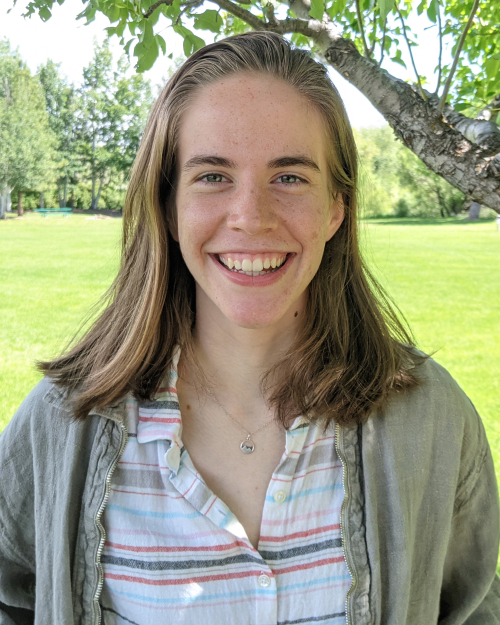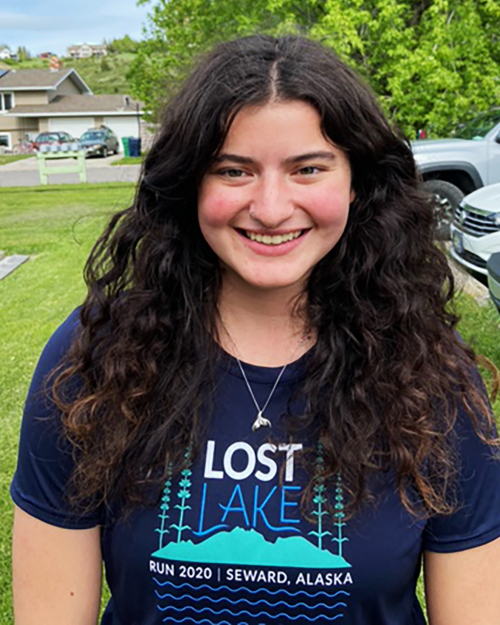Emory Hoelscher-Hull, a Montana State University (MSU) junior, was recently awarded a prestigious public health grant based on her research into water quality in Montana, and Pilar Santos, a junior from Helena in the environmental health option in the Department of Microbiology and Cell Biology in the College of Agriculture, was one of four winners of the 2022 Association of Environmental Health Academic Programs Student Research Competition. The award highlights important environmental health research conducted by graduate and undergraduate students enrolled in accredited environmental health degree programs across the U.S. Sarah Warnke, a senior environmental health major from Eagle River, Alaska, was one of three runners-up for the 2022 Association of Environmental Health Academic Programs Student Research Competition. All three students were mentored with support from Montana NSF EPSCoR by Dr. Mari Eggers, an Assistant Research Professor in the Department of Microbiology and Immunology at MSU and CREWS scientist with the Powder River Basin team.
Emory Hoelscher-Hull - Student Leader in Public Health

Emory Hoelscher-Hull, who is in the environmental health program in the Department of Microbiology and Cell Biology in the College of Agriculture, was selected in a regional competition as a Student Leader in Public Health by the Rocky Mountain Public Health Training Center. She was rewarded with a stipend to help fund her ongoing undergraduate research, which investigates the prevalence of unsafe levels of strontium in home well water within rural Montana counties designated as low income and low access by the USDA. Low access in rural areas is defined by living further than 10 miles from the nearest grocery store.
“It's affirming to get some support and guidance from people in the field and for [the center] to say, ‘We think it’s important what you’re doing, and you should keep doing it’ is a great honor,” said Hoelscher-Hull, who is a member of the Honors College. Hoelscher-Hull was also a Truman Scholarship finalist and a Udall Scholarship nominee.
The goal of the Student Leaders in Public Health program is to enhance the public health workforce in the Rocky Mountain region, specifically in underserved communities and populations, by supporting students who conduct applied health projects and by providing opportunities for mentoring and professional development. This program is funded by the federal Health Resources and Services Administration.
According to Dr. Eggers, who is also the associate director of MSU’s environmental health program, Hoelscher-Hull is one of only four undergraduates in the Rocky Mountain region to ever receive this honor — and the others are former MSU students.
Eggers said Hoelscher-Hull is committed to addressing environmental health disparities and has done a number of things to do so, from organizing a speaker series for students in the Honors College to finding ways to increase student involvement in sustainability initiatives on campus.
“What really stands out about Emory is she just takes the initiative to look into things,” Eggers said about Hoelscher-Hull's research work. “It’s really unusual to have an undergrad find a research question that interests them all on their own, figure out a way to tackle it and go for it. This past fall she taught herself GIS to be able to map her own data before she even took the GIS class. I was really impressed.”
Hoelscher-Hull's undergraduate research went from the classroom to having real-world impact. Strontium is a heavy metal that naturally occurs in rocks. In the body, it acts as a biological replacement for calcium in bone tissue and affects bone growth and density if people who ingest it do not have adequate calcium in their diet.
Her research into ground and well water found amounts of strontium exceeded the recommended levels in parts of north central Montana. She then expanded her research to look at strontium levels across the state and how they overlapped with areas of food insecurity. Hoelscher-Hull said the only way people would know strontium is in their water is by testing the water. But because the areas she’s looking at are low access and low income, people there might not be able to afford such expensive processes.
Hoelscher-Hull is currently in the second phase of her research and trying to do outreach work with local WIC offices and county health departments to raise awareness of the importance of nutrients such as calcium and vitamin D in diets. She would also like to do some testing and treatment of water supplies if possible.
“I wanted to do something I can have interaction with the community, and I feel like through this research you can really see the impact,” Hoelscher-Hull said. “It’s been a great opportunity to network with local health departments and understand a little better how they work. It’s also been a great opportunity to learn more in-depth and practice the skills I’ve been learning in the classroom and apply them to a research project I am interested in.”
Hoelscher-Hull, who is from Seattle, came to MSU initially wanting to do lab research in microbiology. While she found the research to be interesting and have an impact, Hoelscher-Hull wanted to do research that was more hands-on where she could work directly with people. The environmental health track was perfect for her and her interests in community health.
In mid-April, Hoelscher-Hull went to Helena to attend the Montana Public Health Association Conference and presented a poster on her strontium research. Throughout the day she attended sessions, met with public health officials and received feedback on her research and where to go next with it.
“Having the opportunity to do undergraduate research sets you up so well with whatever you end up doing in life,” Hoelscher-Hull said about her time at MSU. “I learned a lot about this process, not just academically, but networking and other professional skills that will help see me through. In two semesters I got to do a ton of real-world stuff which is really rewarding.”
This summer, Hoelscher-Hull will take part in the National Environmental Public Health Internship Program. The program links students from environmental health academic programs with funded internship placements at qualified state, tribal, local and territorial environmental public health agencies across the country. The workforce initiative helps establish pipelines of qualified applicants to meet current and future environmental health professional workforce needs across the nation and encourages students to consider careers in governmental environmental public health.
Hoelscher-Hull was recently paired with Public Health: Seattle and King County, and will now have a chance to serve her home.
“I am thrilled to have been matched with this health department. Not only does it serve the area where I grew up and hope to live in the future, but it is also one of the largest metropolitan health departments in the country so I am sure there will be lots to learn,” Hoelscher-Hull said.
Pilar Santos and Sarah Warnke - 2022 Association of Environmental Health Academic Programs Student Research Competition

Pilar Santos, a junior from Helena in the environmental health option in the Department of Microbiology and Cell Biology in the College of Agriculture, was one of four winners of the 2022 Association of Environmental Health Academic Programs Student Research Competition. The award highlights important environmental health research conducted by graduate and undergraduate students enrolled in accredited environmental health degree programs across the U.S. Sarah Warnke, a senior environmental health major from Eagle River, Alaska, was one of three runners-up for the national award.
As part of the recognition, Santos and Warnke virtually presented at the association’s student symposium in May.
“It was a really cool experience to present and to hear from people in the environmental and public health community,” Warnke said. The symposium provided resources for people in many areas of the industry including building future connections for Warnke, she said.
Santos will go on to present her research at the 2022 National Environmental Health Association annual education conference from June 28 to July 1 in Spokane, Washington. “It definitely is an honor to be recognized and have our research be a part of these environmental health events,” Santos said.
Under the guidance of Dr. Eggers, Santos and Warnke completed a cumulative health risk assessment of water contaminants in different watersheds across Montana using state data on watersheds and private wells.

Warnke presented her initial results for Helena area watersheds at the Montana Environmental Health Association this spring. The results and summaries of risks will be shared directly with county health departments to increase awareness, and hopefully home well water testing, in each county, Eggers said.
Montana watersheds are affected by several factors, Santos explained.
“In water sources close to Yellowstone National Park or other geothermal locations, arsenic can naturally be found, or in watersheds with uranium, manganese or other deposits, heavy metals can affect the drinking water,” she said.
Some water contaminants can have no taste or smell and don't discolor the water, Eggers said.
“You would have no idea from drinking the water that there could be anything wrong with it. That’s why watershed testing is a really important public health issue that we can help address,” she said.
The project helped make Montanans aware of water quality issues in their area and provided the next step to test private wells, Eggers said.
“Through this research, I found out that there isn’t statewide water quality testing currently available. It is completed county-by-county, and not every county health department has the resources to do water quality management,” Warnke said.
Nor do many homeowners realize the importance of regularly testing well water, Eggers said. As a part of the cumulative health assessments, Eggers and the students teamed up with the Montana Well Educated Program, an MSU Extension water quality program designed to offer well testing and information clinics.
“Sarah and Pilar are doing the data-heavy analysis, and they were excited to take on research that is directly relevant and important to Montana communities,” Egger said. “They are dedicated to this research and outreach, a pleasure to work with and well-deserving of this honor.”
Santos, who is working at Montana Department of Environmental Quality in Helena over the summer, said she has realized how interconnected environmental health is with the daily lives of Montanans.
“Doing the water quality research this spring and now working on this internship, I am realizing how stuff that is happening day-to-day can cause serious impacts to our health,” she said. “I'm very interested in continuing to study impacts on global and environmental health.”
Warnke is working with Eggers and MSU Extension Water Quality Specialist Adam Sigler to complete a more advanced analysis of Montana watersheds this summer. She received funding from MSU’s Undergraduate Scholars Program and INBRE.
“It's the first time I've gotten paid to do research,” Warnke said. “It's super cool that MSU gives us the opportunity to do funded research.”
Health professionals interested in risk analyses of the groundwater or watersheds in their county are encouraged to contact Eggers, at mari.eggers@montana.edu or 406-994-3064.